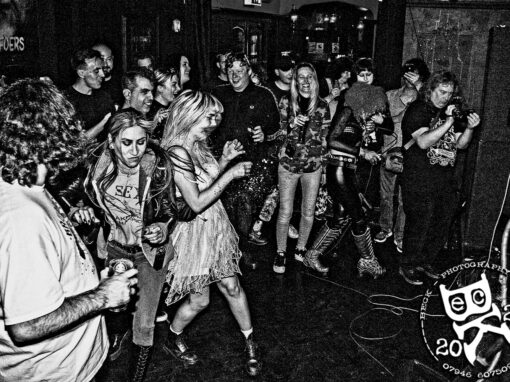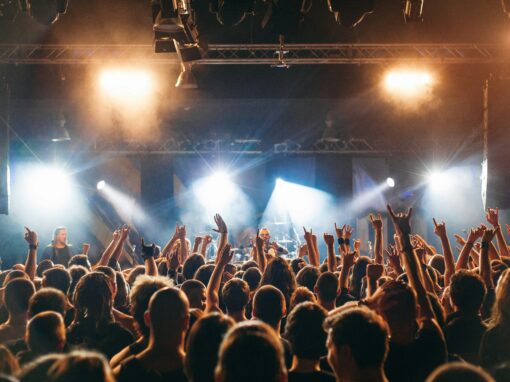Image by Filip Andrejevic on Unsplash
Touring used to be the lifeblood of a band’s career: a chance to connect with fans, earn a living, and build momentum. However, hitting the road has become a complex and costly endeavour, one that many artists struggle to navigate. From skyrocketing expenses and environmental concerns to burnout and changing audience habits, the reality of going on tour is shifting beneath our feet.
Musician and former gig promoter Vincent Ramsey explains that smaller bands often don’t have the funds to tour, which limits their chances of getting noticed and finding new opportunities.
“My band has to travel to venues to put on gigs, and do we make any money out of it? Never. We’ve got a little band fund, from which we sell merchandise – CDs, t-shirts , all that sort of thing, and that generally ends up covering the petrol cost as well as the little sum you get from a venue.
The music industry has become a little polarised with regard to the sort of acts it’s pushing. It’s pushing solo singer songwriters, DJs or people who collaborate with each other. It’s not pushing bands much at all, because they’re much more costly things to push.
“If you’re a young band trying to start off, trying to break it, and haven’t got something like an income to rely on, you’re screwed. That’s what stops people from being able to progress in the music industry.
Ramsey also notes it’s not just bands that are struggling to facilitate touring, but rather the whole ‘ecosystem’ of independent music.
“I fully empathise with venues, they’ll just say, yeah, we’ll have you playing, but we can only give you a sort of 50 quid towards petrol money.
“There’s a venue in Rotherham called the hive that announced a while ago it is closing for gigs and is now going to be a supermarket of some sort. It was a very small venue, but if they can’t make it work, who can?
“This is indicative of people saying ‘I can’t go and see people on tour because I can’t afford it’, or ‘it’s not going to be very good because it’s cheap’ – ok but some of the best bands I’ve ever seen have been in small venues.
“If your perception is that you’re only going to see big bands at big arenas, but it’s going to cost you an arm and a leg, everything else will just suffer and die. Venues are falling apart because of it”
Ex-drummer for the band Vivas, Keaton Barker – who supported Bryan Adams on tour and played many shows and festivals themselves- agrees that smaller venues are integral for bands and playing them is what makes being a musician worth it.
“For a band fresh on the scene, playing big stages is definitely a dream, and we were really grateful for those opportunities. But for us, it all started from the ground up. There’s something truly special about playing to your close-knit crowd – your friends, family, and fans – where everyone knows your story and songs. It feels like a community, like a family.
A lot of these smaller venues don’t get a lot of publicity as well, which is a shame, because, you know, there’s lots of bands out there playing them, that you probably never heard of. They might be in the next Oasis, but if the venues close, you don’t get to see them.”
Due to the cost of touring, such as hiring out the venues, it often means bands have to up ticket prices to support themselves.
Barker said, “for us as a band, ticket sales has been one of our main ways of connecting with fans and obviously bringing in revenue as well. But when those prices go up, it’s a bit of a barrier, especially for the fans wanting to come to gigs.
“If you, if you’re running a show, you got to play for production, electricity, security. There’s lots that goes on and that can all contribute to the rising ticket prices.
“The gigs I played in the past totally depended on if we’re promoting it ourselves or if it’s an external promoter for the venue. So if we did do it ourselves, meaning we hire the venue, we pay the hire fee, and then we promote it ourselves, we could sort of work around what we wanted to charge people.
“We tried to keep it low cost, so I think the most we charged was around 10 pounds a ticket for a show at Network,in Sheffield – that was through an external promoter. So we didn’t actually get a choice in that matter. But yeah, I felt bad even charging 10 pounds.”
Overall the rising costs of venues, travel and ticket all play a part in the added difficulty to put on a tour.
Barker said: “There’s a lot of people in the industry that are affected by it, but we wanted our fans to come to the shows, it’s about balancing that cost and making live music feel accessible as well.”
Without affordable venues, sustainable touring options, and accessible ticket prices, both artists and fans risk losing the intimate, community-driven experiences that make live music so vital. Supporting small venues and emerging bands isn’t just about entertainment – it’s about preserving the heartbeat of the music industry itself.
For more stories on music click here: Music – Illuminated





